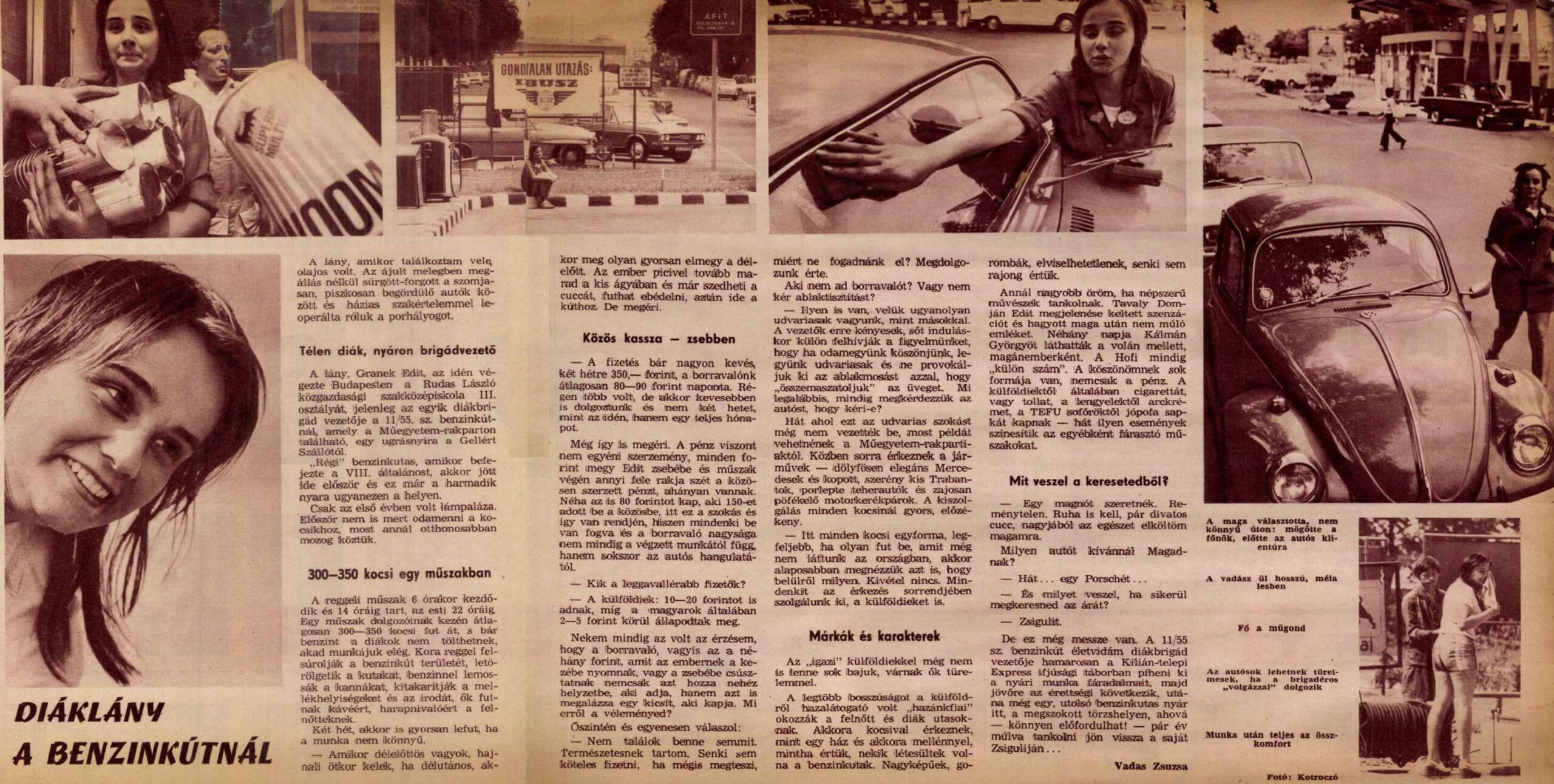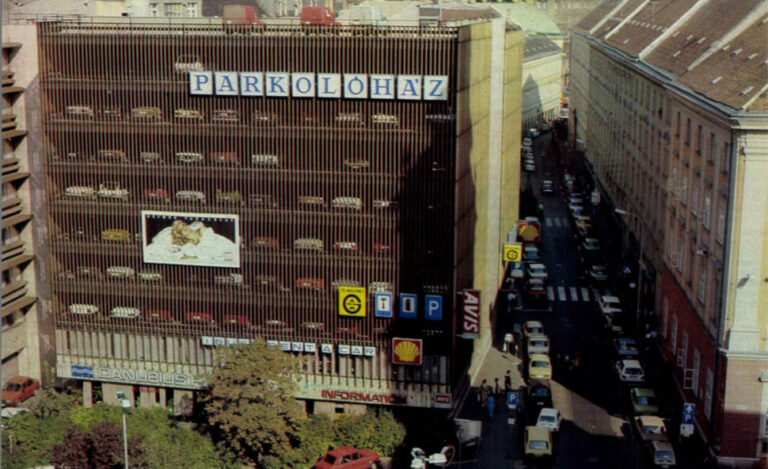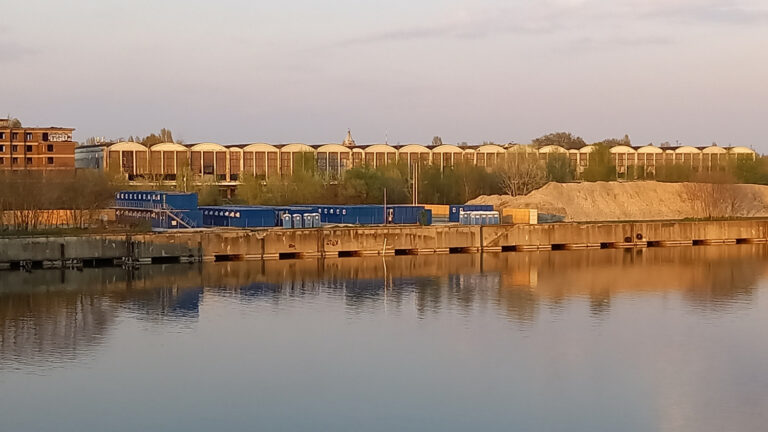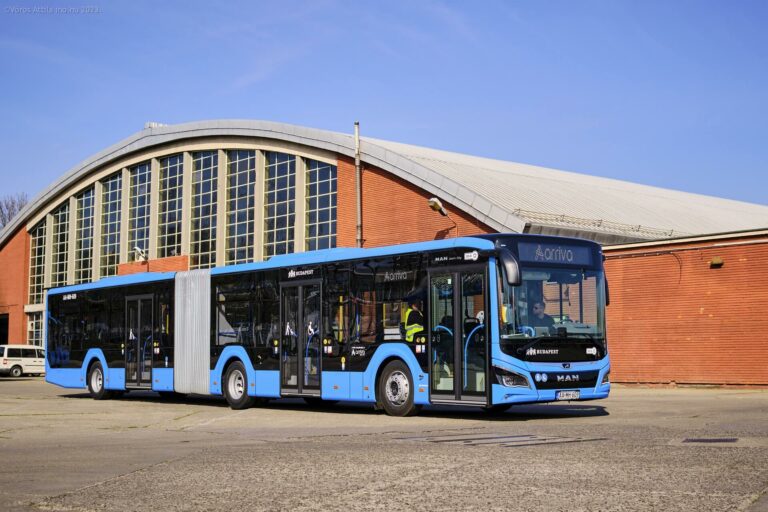1973 - Schoolgirl at the petrol station
Autó-Motor of 21 June 1966 reported the news that "The largest petrol station in Budapest has opened on the Technological University quay. Motorists and motorcyclists can line up on both sides of the six petrol stations built into the axis of the divided-lane road."
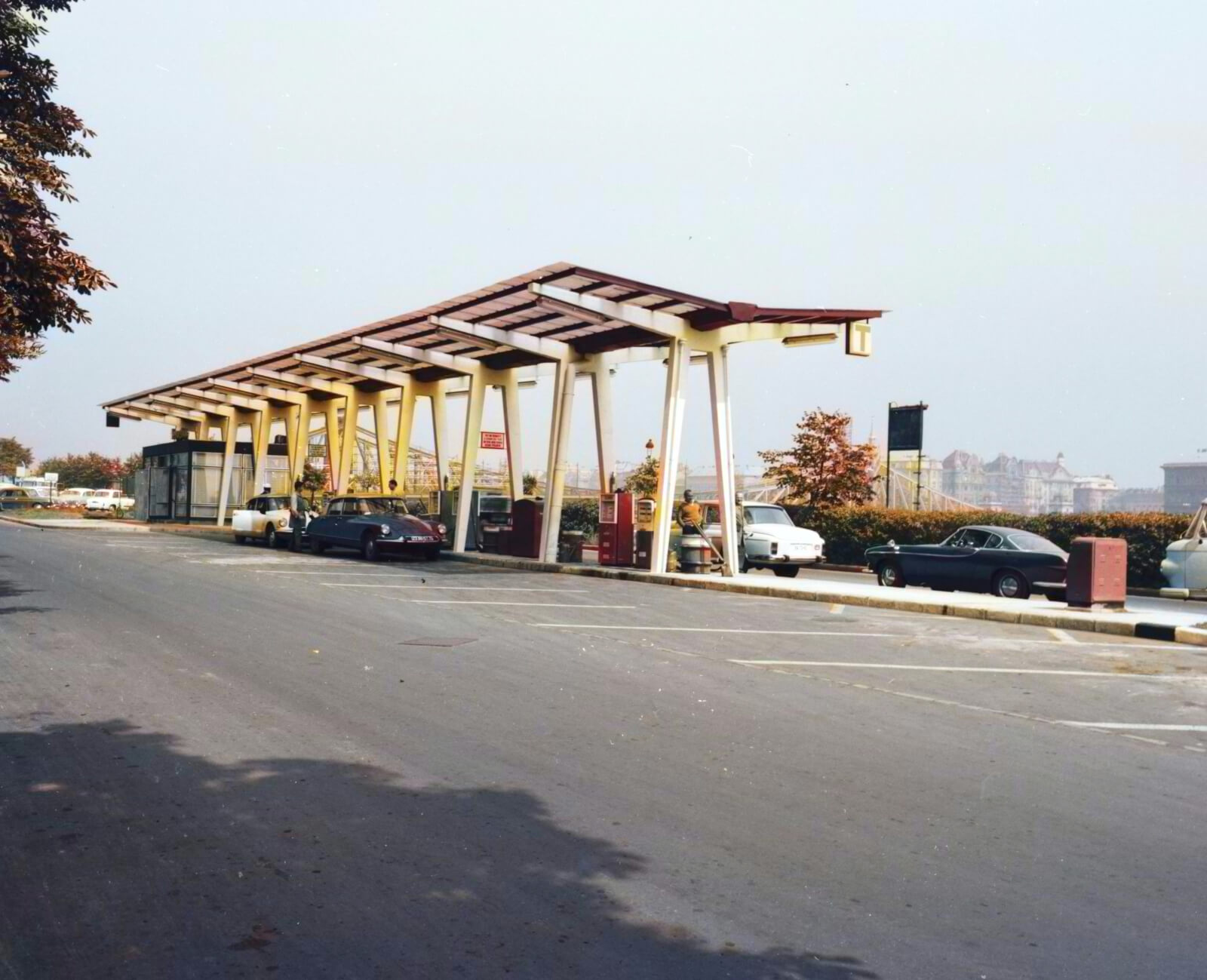
Hungary, 1966. Budapest XI. Műegyetem rakpart, petrol station. - Image source: 252274 / FŐMTERV / Domonkos Endre - (tinted afterwards)
Anyone familiar with the area knows that the site is a stone's throw from Gellért Square, one of Buda's busiest transport hubs. This is the junction of the Béla Bartók and Budafok roads, which, together with the quay, already handled a significant part of the traffic in the south of Buda and the agglomeration before the turn of the century. From the opposite direction, the Szabadság Bridge from Pest and the Szent-Gellért and Lower Quays from North Buda enter the square.
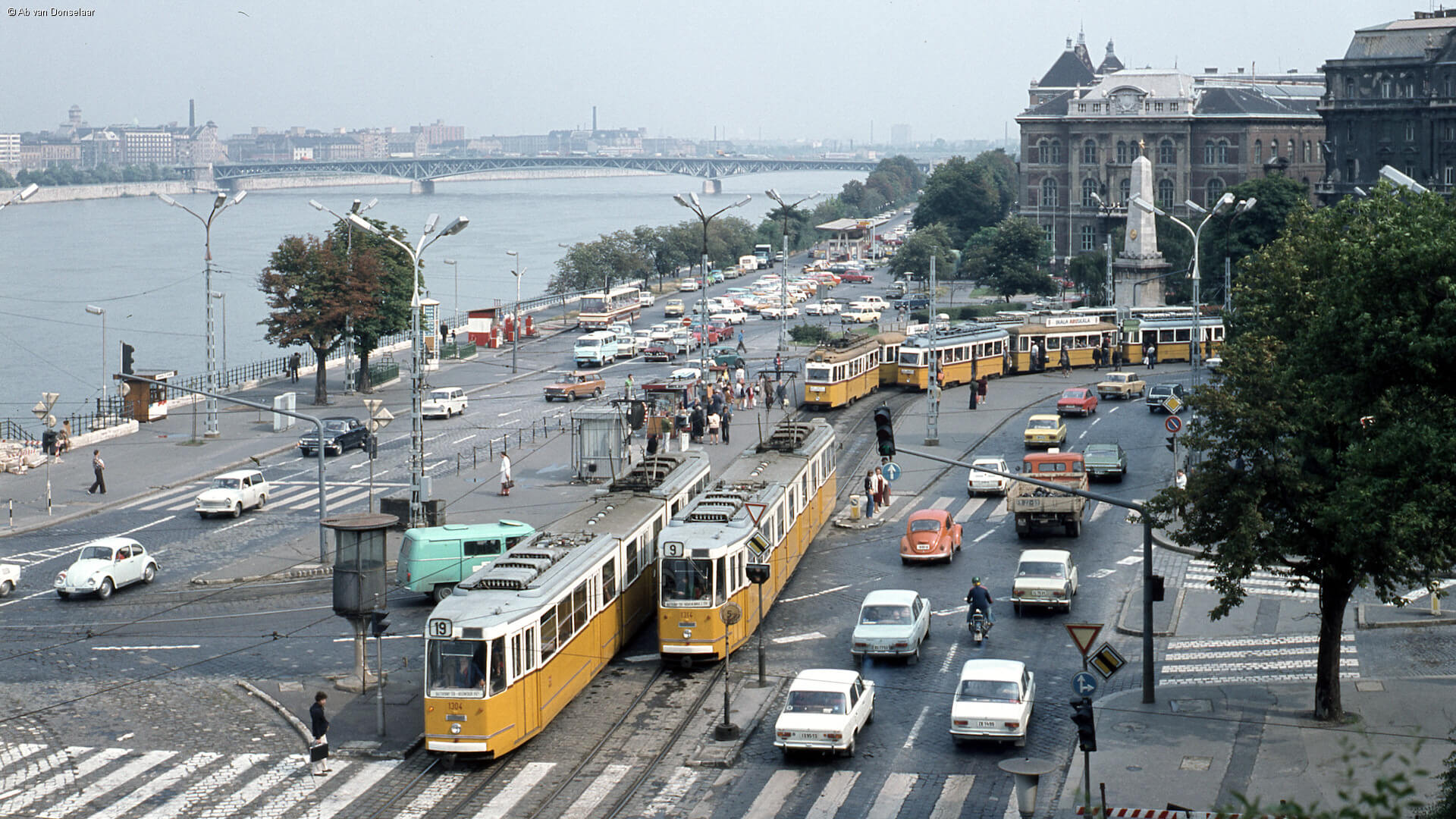
A 1976 photo of the square, with the well in the background - Image source: hamster.blog.hu - Photo by Ab van Donselaar
This is the site of the small-town-sized Technological University and one of the most impressive buildings in the entire capital, the Gellért Hotel, which since its opening in 1918 has made the area not only a transport hub but also a tourist hub.
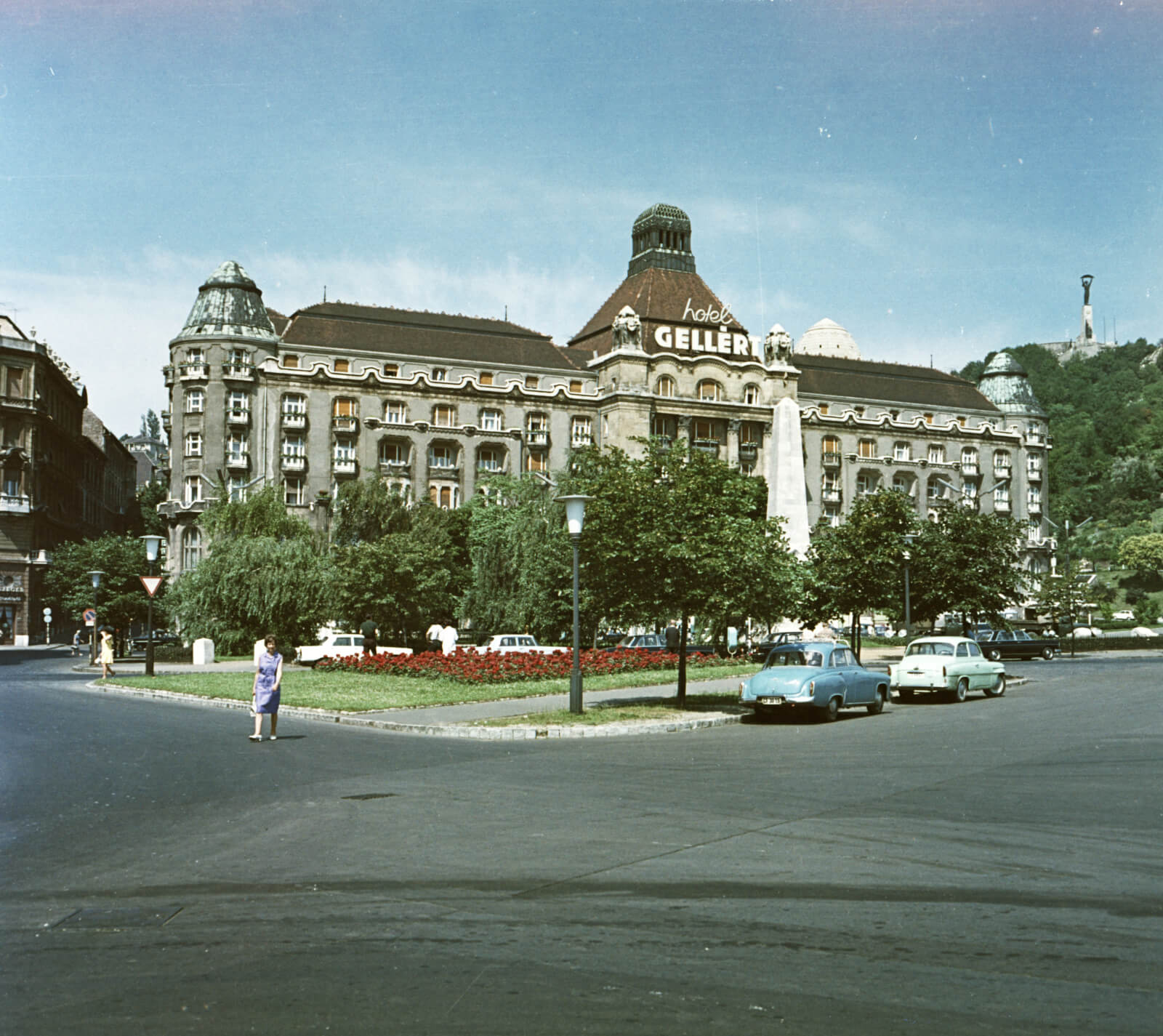
The Gellért Hotel in 1966, the year the petrol station was opened - Image source: Fortepan 252362 / FŐMTERV / Domonkos Endre
In Hungary, and especially in Budapest - unlike in the more fortunate countries and cities of the world - there were two great automotive booms in the 20th century. The first - parallel to Europe and America - lasted from the decade of the decade or so - from the mass appearance of the car - until World War II, but while in the West, with peace and consolidation, the car was slowly but surely restarted, in Hungary - because of the ban on it - we had to wait until 1958. In Hungary, it was only from that time that private individuals were allowed to buy cars at all, and it was only from 1959 that the same relaxation applied to new vehicles.
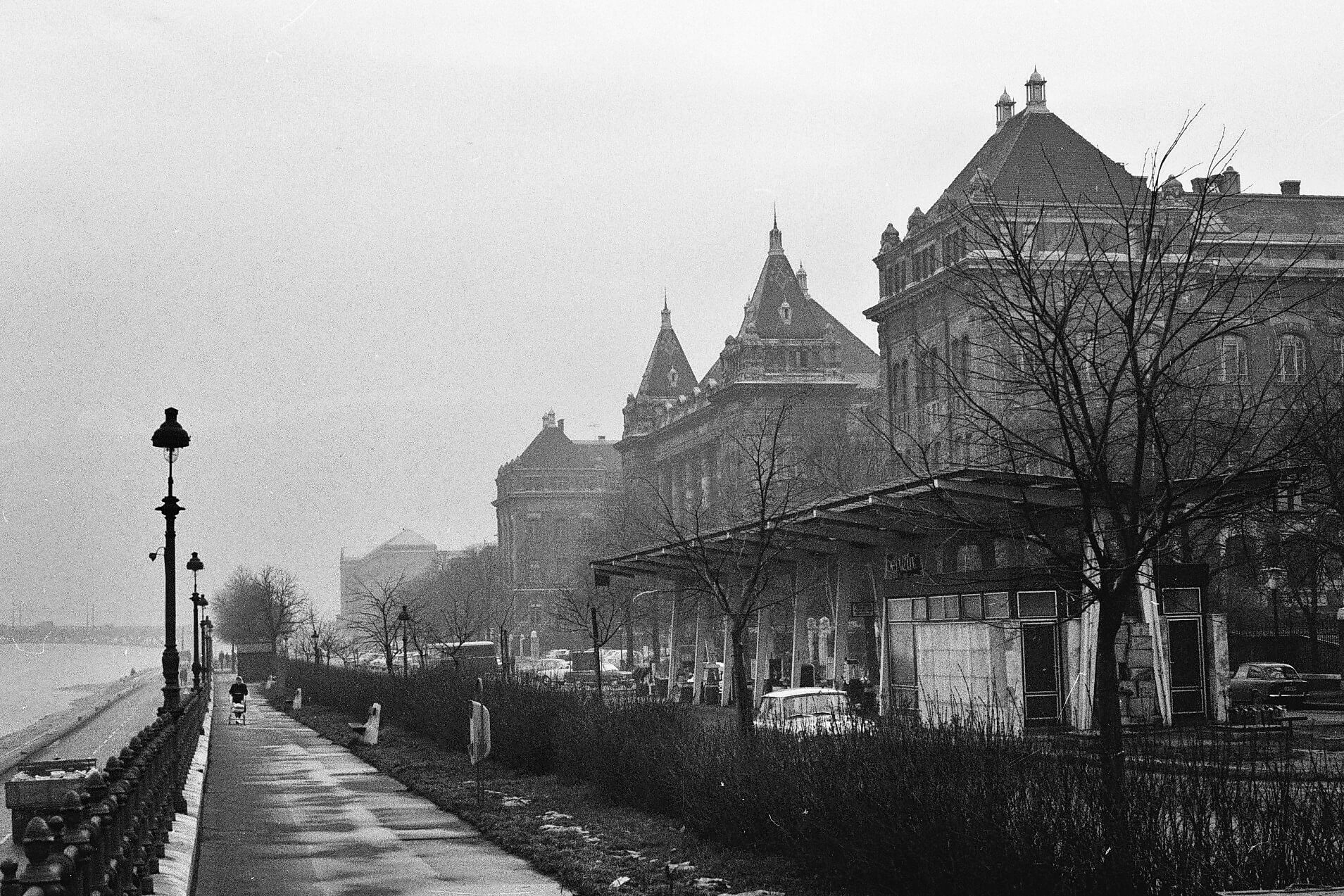
Hungary, 1967 Budapest 11th Technological University quay and petrol station from a less photographed angle. - Image source.
While in 1957 there were 12 728 cars in the country, of which only 3 980 were privately owned, by the end of 1965 this number had risen to almost 100 000, of which 82 640 were owned by private individuals. If we add to this the fact that there were almost three cars in Budapest for every one in the countryside, it is easy to see that by the mid-1960s the low number of petrol stations in the capital had become a problem. The situation at the time was illustrated by the fact that Austrian motoring tourists were advised in printed material before their visit to Hungary to carry spare petrol and pumps, without which they could easily get into trouble on the roads.
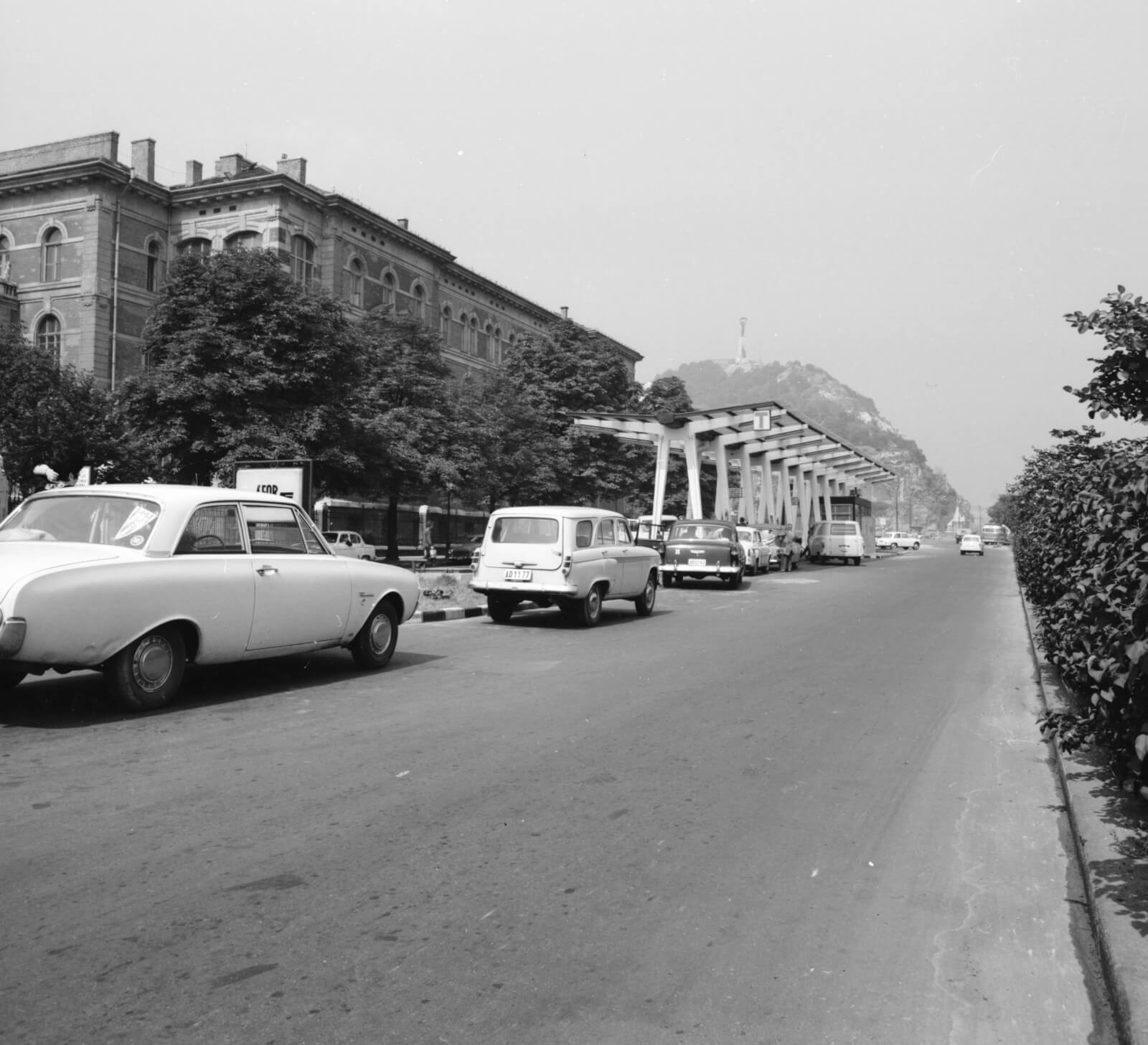
Hungary, 1966. Budapest XI. Műegyetem rakpart, petrol station. - Image source: fortepan 252275 / FŐMTERV / Domonkos Endre
The establishment of new wells was therefore more than justified, and the opening of the University of Technology-Rakart unit mentioned in the article was met with considerable media coverage by the standards of the time. It was one of the first six-pole wells in the country, with technical content already meeting the requirements of the time: electric pumps, large underground storage tanks. (At that time, most of the petrol station stock was still hand-pumped, small 2-2.5 m³ stations.) As an indication of the privileged status of the station, it was here, next to the Mészáros Street station in the 1st district, that 98 petrol was first sold in the capital in 1967, at a price of 5 ft 30 cents per litre.
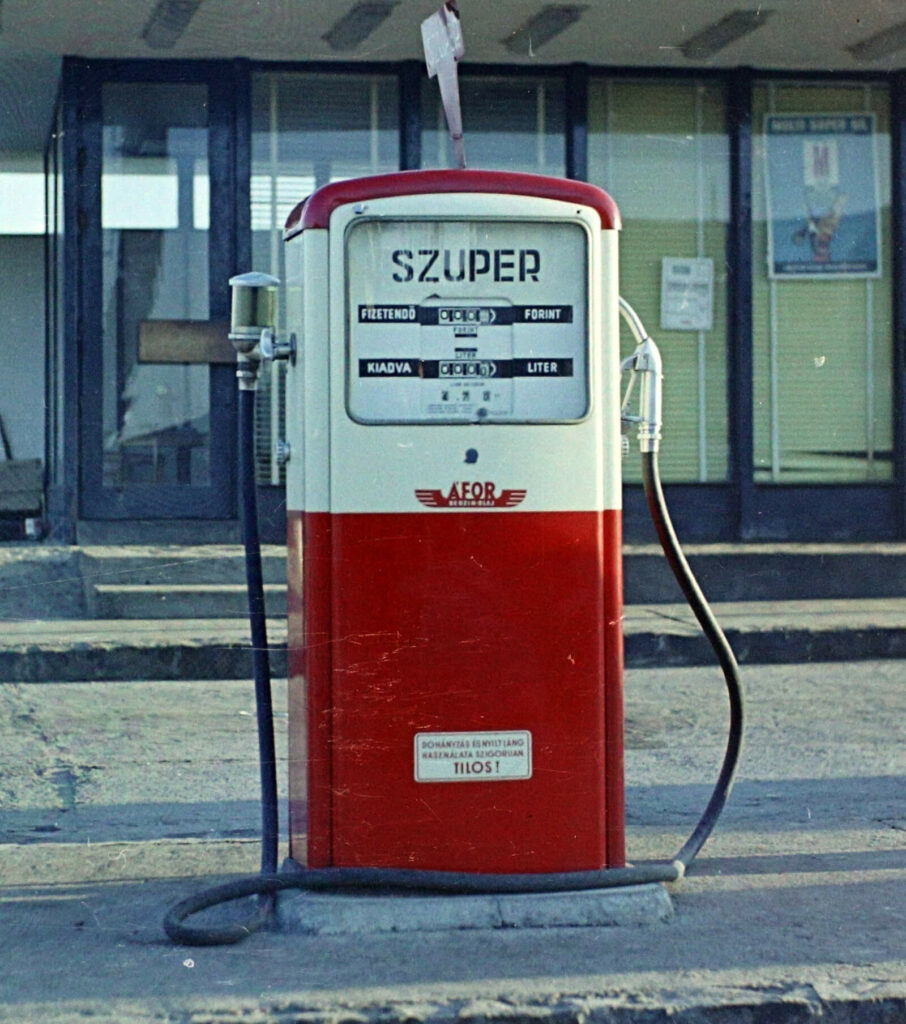
Somewhere in Hungary in 1968. Super petrol was 4,70,-.- Image source: Fortepan 94718 / UVATERV
The petrol station at Műegyetem dock was closed down after the change of regime, in 1991 or 92, as part of an urban development plan that never materialised: the six-hectare new part of the city, linked to the planned EXPO 96, now called Infopark, was to have been connected to Gellért Square by tram, but the line was not built, along with the World Expo.
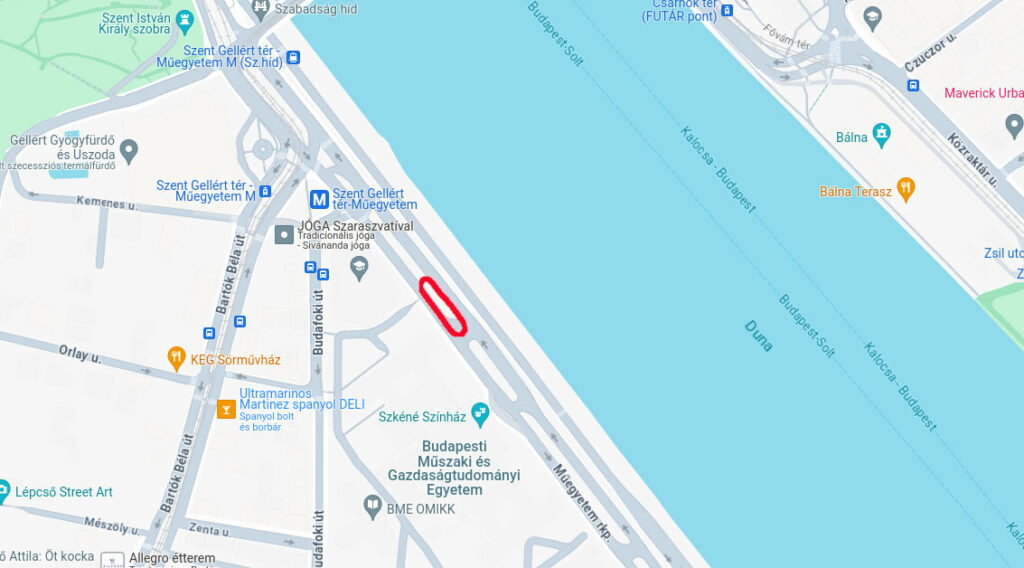
The former site of the petrol station
It was also a prestigious place to work, with many foreign drivers using the service.
Below is a photo report about the petrol station and the student worker girl who works there in the "Volán" newspaper August 1973 was published in the first issue of Zsuzsa Vadas from the pen "Kotroczó" with photos. The article and accompanying photos are published without changes.
Have a nice trip through time!
♠

The girl when I met her was oily. In the sweltering heat, she hurried non-stop between the thirsty, dirty cars and surgically removed their cataracts with domestic skill.
Student in winter, team leader in summer
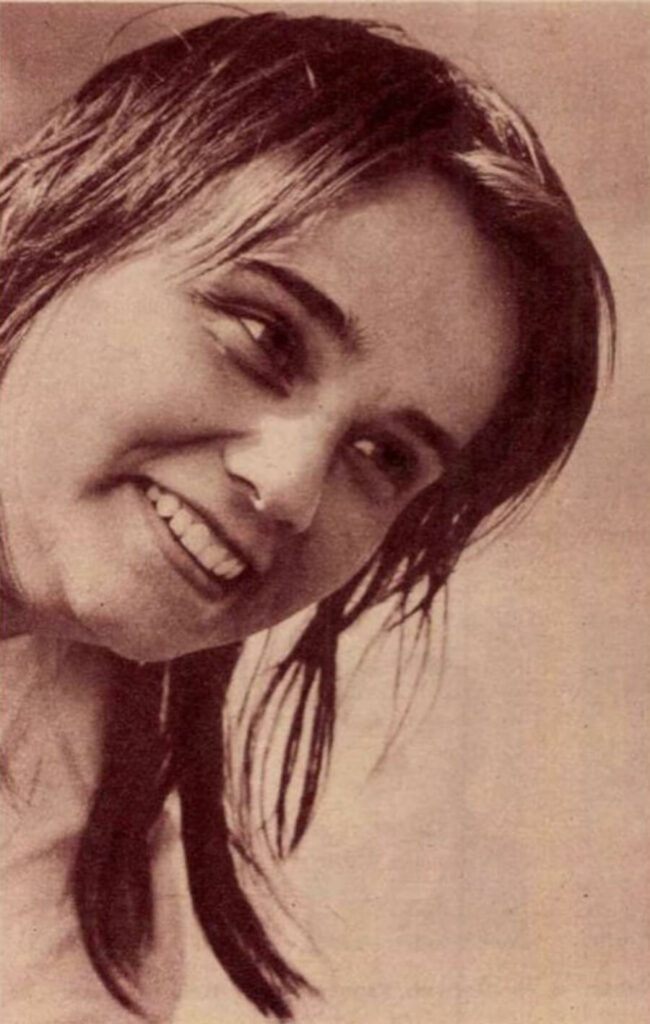
The girl, Edit Granek, graduated this year from the Rudas László III.
and is currently the leader of one of the student brigades at petrol station No 11/55, which is located on the University of Technology
just a stone's throw from Hotel Gellért.
"Old" petrol station attendant, when he finished his VIII grade, he came here for the first time and this is his third summer in the same place.
He only had stage fright in the first year. At first he didn't even dare to go near the cars, but now he's more at home among them.
300-350 cars per shift
The morning shift starts at 6am and lasts until 2pm, and the evening shift until 10pm.On average, 300-350 cars pass through the hands of the shift workers, and although students are not allowed to fill up with petrol, they have plenty of work. Early in the morning they scrub the petrol station area, wipe down the wells, wash the cans of petrol, clean the toilets and the office, and run to the adults for coffee and snacks.
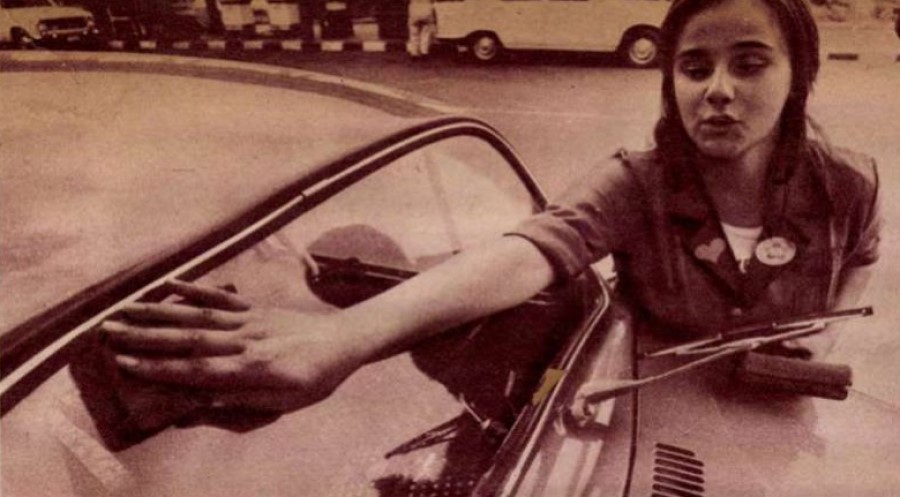
The road you have chosen is not easy: the boss behind you, the car clientele in front
Two weeks can go by quickly, even if the work is not easy.
- When I'm a morning person, I get up at five in the morning, and when I'm a midday person, the morning goes by so fast. You stay in your little bed a little longer and you can get your stuff, run to lunch and then come to the well. But it's worth it.
Common treasury - in pocket
Although the pay is very low - 350 forints for two weeks - our tips average 80-90 forints a day. It used to be more, but then we worked less and not for two weeks like this year, but for a whole month.
It's still worth it. But the money is not an individual acquisition, every penny goes into Edith's pocket and shift
at the end, as many people as there are will distribute the money they have earned together. Sometimes even those who have contributed 150 get 80 forints, this is the custom here and it is right, because everyone is stuck and the amount of the tip does not always depend on the work done, but often on the mood of the driver.
- Who are the most generous payers? -
- Foreigners: 10-20 forints, while Hungarians usually settled for around 2-5 forints.
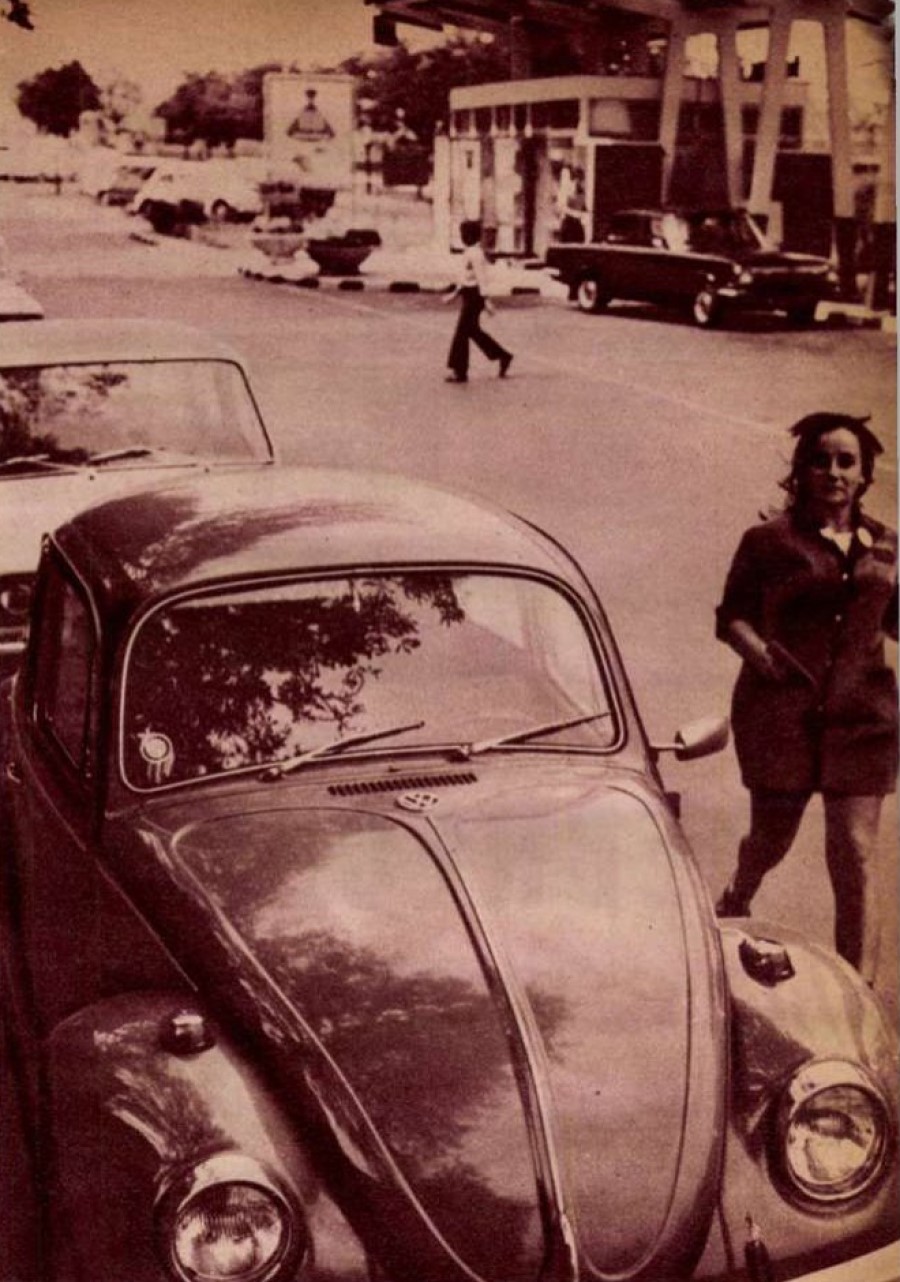
Motorists can be patient when the brigadier is "full throttle"
I have always had the feeling that tipping, that is, the few forints that are put in your hand or slipped into your pocket, not only puts the person who gives it in a difficult situation, but also humiliates the person who receives it. What do you think about this?
He answers honestly and directly:
- I can't find anything in it. I find it natural. No one is obliged to pay, but if they do, why shouldn't we accept it? We'll earn it.
Who doesn't tip? Or doesn't ask for a window cleaner?
- We are as polite to them as we are to others. The drivers are sensitive to this, and even remind us when we leave to say hello, be polite and not provoke the window cleaning by "smashing" the glass. At least for us, we always ask the driver if he wants it.
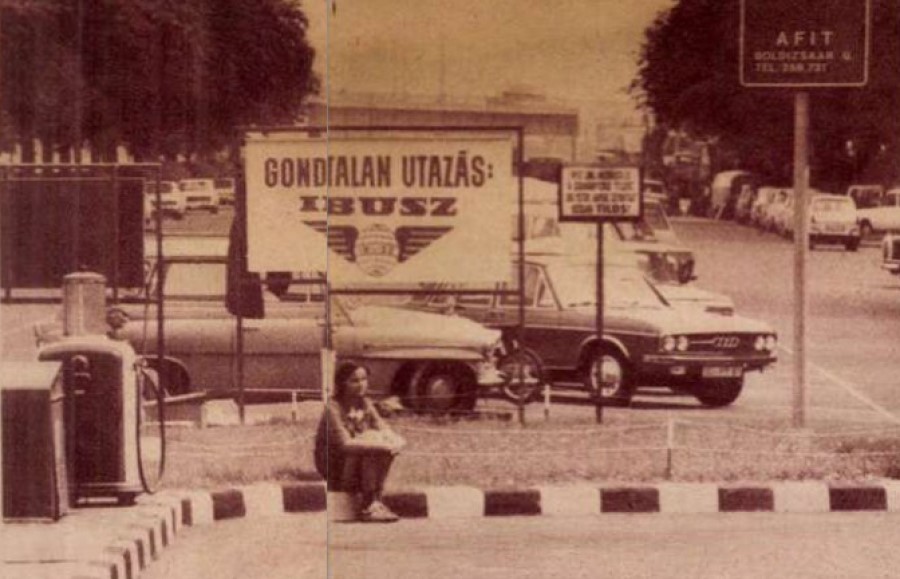
The hunter sits in a long, honeyed ambush
Well, where this polite custom has not yet been introduced, they could take a leaf out of the book of the University of Technology. Meanwhile, one by one the vehicles arrive - swanky Mercedes and shabby, unassuming little Trabant, dusty lorries and noisy motorbikes. The service at each car is fast and courteous.
- Here, all cars are the same, except when one comes in that we haven't seen before in the country.
we also take a closer look at what it looks like from the inside. No exceptions. Everyone is - in the order of arrival
we serve, including foreigners.
Brands and characters
With the "real" foreigners they would not have much trouble, they wait patiently.
Most annoyance is caused to adult and student travellers by former "countrymen" returning from abroad. They arrive with a car as big as a house and a chest as big as if the petrol stations had been built for them. They are pompous, rude, insufferable and nobody is a fan of them.
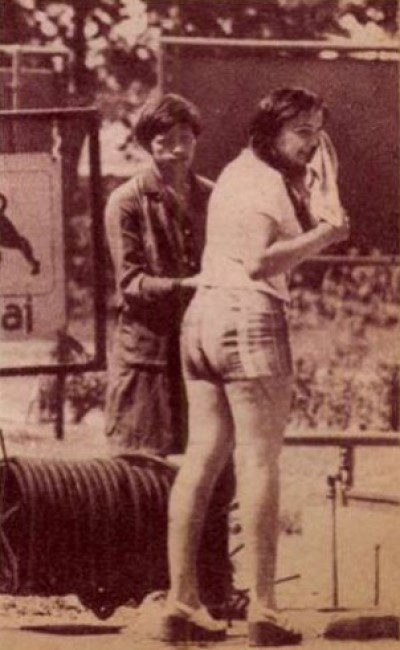
Total comfort after work
It's all the more fun when popular artists fill the tank. Last year, the appearance of Edit Domján caused a sensation and left a lasting memory. A few days ago, György Kálmán was seen behind the wheel in private. The Hofi is always a "special edition". Thank you takes many forms, not just money. Foreigners usually get a cigarette or a pen, Poles a face cream, TEFU drivers a cool hat - events like this add colour to otherwise tiring shifts.
What do you buy with your earnings?
- I want a tape recorder. It's hopeless. I need clothes, some fashion stuff, I'm spending pretty much all of it
to myself. What kind of car would you want for yourself?
- Well... a Porsche...
- And what will you buy if you manage to find the price?
- Zsigulit.
But that is still a long way off. The lively student brigade leader of the 11/55 petrol station will soon be relaxing from the summer work at the Express youth camp in Kilian, followed by his graduation next year, and then one last summer as a petrol station attendant here in the familiar home town, where - it could easily happen!
he'll be back to refuel in his own Gig...
Zsuzsa Vadas
